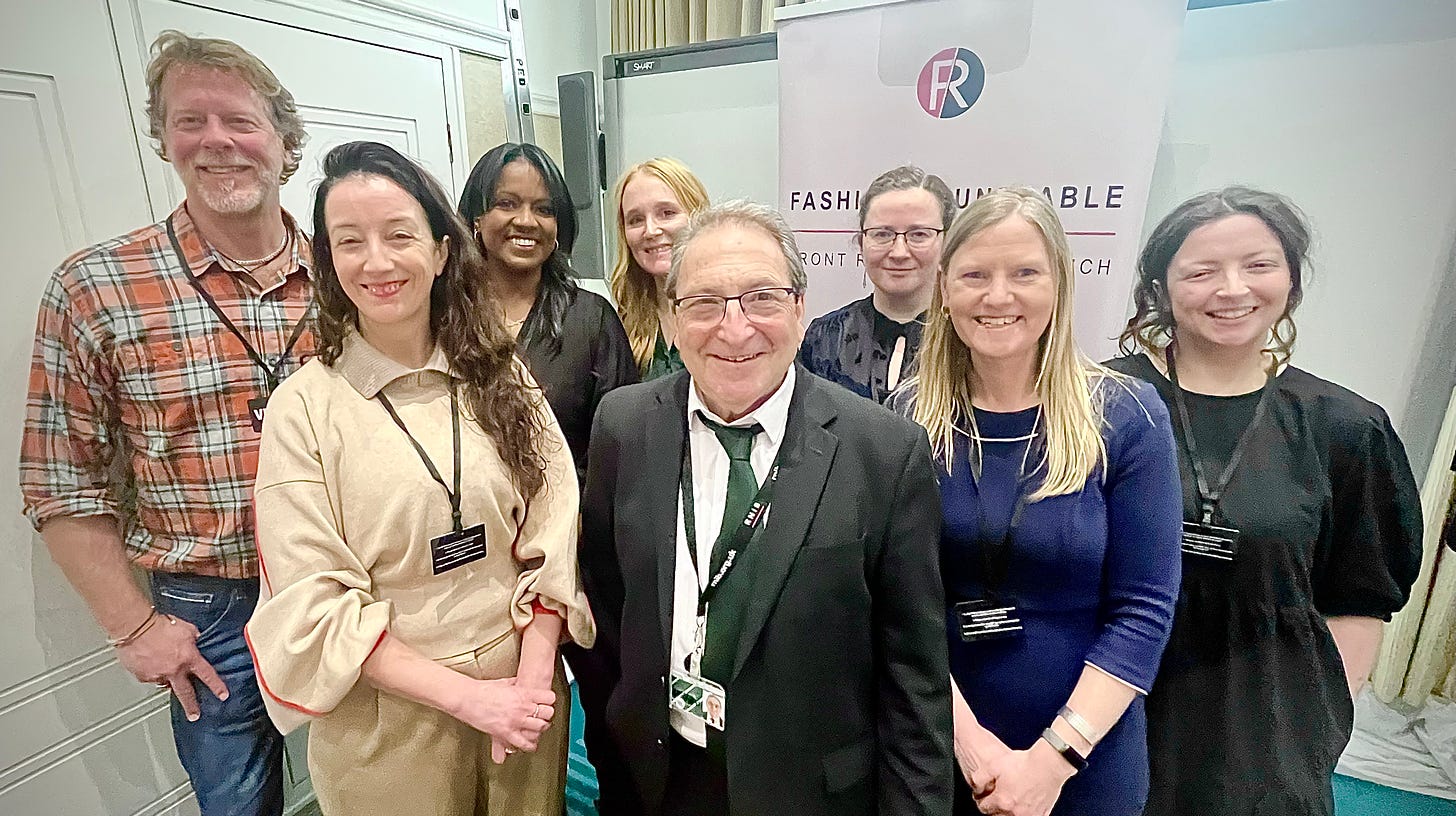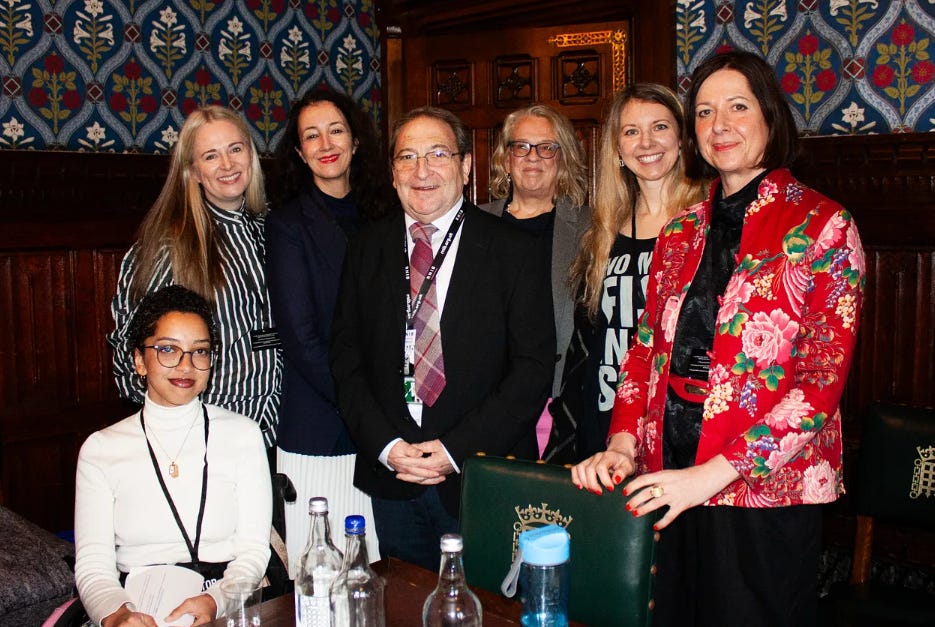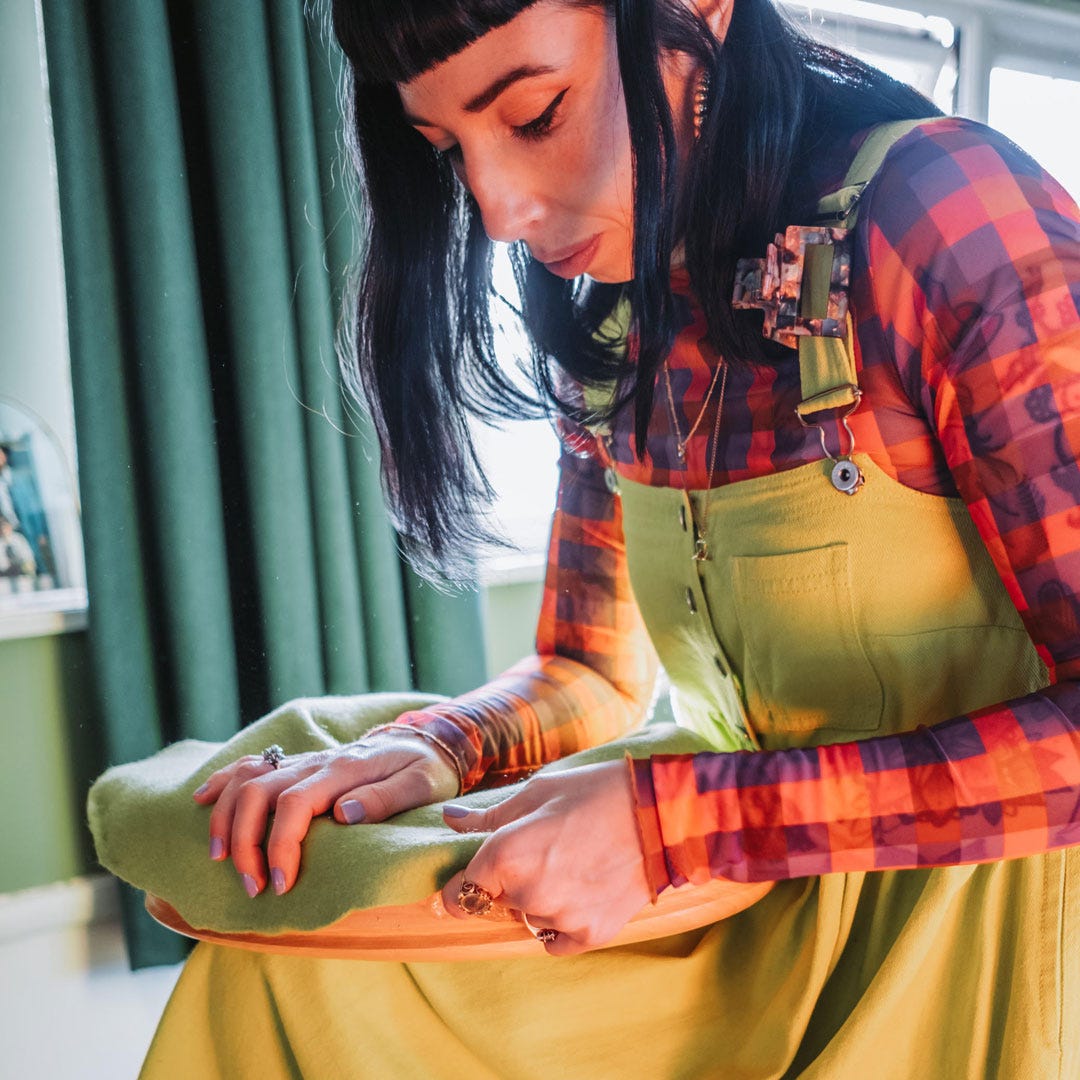Inside Westminster: A busy and thought provoking meeting on preventing greenwashing by Melanie Pope
Also this week - a spotlight on London Craft Week with Heritage Crafts CEO Daniel Carpenter

Inside Westminster: A busy and thought provoking meeting on preventing greenwashing by Melanie Pope
Fashion Roundtable acts at the Secretariat to the All Party Parliamentary Group on Ethics and Sustainability in Fashion (and now Hairdressing). When we heard last month’s news that the Competitions and Markets Authority had received voluntary undertakings from Asda, Boohoo and ASOS to only make “clear and accurate” green claims, and that they had also written an open letter to the fashion industry, we knew this had to be focus of our next meeting.
Yesterday in Parliament, MPs, those from industry and sustainability experts came together to discuss the progress made on preventing greenwashing so far and share ideas on what can be done next.
We were lucky enough to be joined by senior staff from the Competitions and Market Authority who worked on the investigation into Asda, Boohoo and ASOS and were able to explain what the voluntary undertakings mean in practice. There was widespread agreement in the room from MPs to industry that ensuring green claims are easy to understand is vital in ensuring public confidence when they are buying clothes. Consumers often want to buy sustainable clothing but without clear and transparent labels, or if potentially misleading pictures are used, it can be difficult for all of us to be sure what we’re actually buying. Unsurprisingly, there was strong support for the work the CMA have done to achieve these undertakings and a feeling we are headed in the right direction even though attendees would like to see further change.
Attendees then heard from the Chair of the Environmental Audit Committee (EAC), Rt Hon Philip Dunne MP which was particularly timely given the EAC are today holding a one-off session into progress made since their Fixing Fashion report was published in 2019. He spoke about the importance of a range of issues within the industry from tackling modern slavery to improving the way we recycle clothing in the UK. Today’s session is likely to be a fascinating one, especially given he was able to share with the group that the Fixing Fashion report was one of the most downloaded Select Committee reports ever. If you want to watch along, you can do so here.
He was followed by Sir Chris Bryant MP, the Shadow Minister for the Creative Industries who also shared his support for the work the CMA had done in sending a message to the fashion industry to embrace green practices. Discussing the sheer scale of the challenge climate change presents, he reflected on the importance of the role of the fashion industry, discussing how the clothes we wear and the way we recycle them is crucial, alongside other issues such as how much we fly or the types of boilers we use.
We then heard from a range of people working in fashion and sustainability, each sharing more detail from their areas of expertise. This included discussion of how much more work there is to be done to ensure true transparency in fashion supply chains because without this level of transparency it is hard for any organisation to make substantiated green claims. This lack of transparency also has a negative impact on garment workers overseas when risk is passed down the supply chain. The impact of sustainability on small businesses, who are often already operating in a sustainable and circular way, but facing an unlevel playing field with bigger companies was highlighted. Finally we heard about similarities between the fashion and beauty industries and the important work being undertaken by the beauty industry to try and minimise plastic waste.
After such an insightful discussion, attendees enjoyed a well-deserved cup of tea thanks to our brilliant APPG Chair, John McNally MP and a chance to carry on the discussion informally.
If you would like to know more about the APPG please visit our website here.

London Craft Week 13th-19th May 2024
London Craft Week is back for their 10th year next month. The festival brings together over 750 established and emerging makers, designers, brands and galleries from around the world.
It encourages attendees to discover hidden workshops, independent makers, heritage craftsmen and jewel-like shops alongside great luxury houses, famous artists and designers, leading department stores, national museums and contemporary galleries.
Don’t miss the Maison Michel demonstration of their hat-making and millinery crafting processes of their most iconic pieces at the Parisian atelier’s Mayfair boutique.
Discover the process behind the creation of the iconic Christian Louboutin red soles with expert artisans from the atelier in Paris.
A spotlight on Heritage Crafts and London Craft Week with Daniel Carpenter
Please could you introduce yourself and the Heritage Crafts to our readers and explain what you do?
My name is Daniel Carpenter and I'm the Director of Heritage Crafts. We are the charity set up to celebrate, support and safeguard traditional craft skills, and to facilitate a national conversation about their importance to everyone now and in the future.
I have noticed that London Craft Week is becoming a much larger event each year, why do you think that is?
We get a sense that public awareness and interest in skilled craftsmanship is increasing year on year. Events like London Craft Week and programmes like the Sewing Bee and Repair Shop are both reflecting that interest and also driving new enthusiasm. While this is wonderful, we at Heritage Crafts also feel that it's really important to progress people from being passive consumers of craft (and craft-based content) to being active participants too.
The Heritage Crafts publishes your annual Red List of Endangered Crafts. What was the aim of this and what changes have you seen to the list since you started collating it - good or bad?
The Red List is the first research of its kind in the UK to rank craft skills by the likelihood that they will continue to the next generation. Its intention is not to preserve every craft just as it was in the past, but rather to facilitate a national debate about the cultural value of these skills in the future. Since we published the first edition in 2017 it has featured extensively in broadcast and print media. We have begun to see some changes, including crafts such as rug tufting and pole lathe bowl turning that have come off the Red List. However, the challenges facing craftspeople and small businesses are unrelenting, including cost of materials, export tariffs, energy costs, competition from low-wage economies overseas, and the lack of financial support for training.
What would you like to see done to support craft in education?
More creative and haptic subjects taught inside and outside of schools, which would increase dexterity and knowledge of material properties, as well as improving young people's sense of agency and their awareness of the opportunities around craft careers. A better careers advice service is also much needed.
What are the core craft skills which you see as vital to the national identity and why?
Many of our places are built on our craft skills: hatmaking in Luton, shoemaking in Northampton, jewellery in Birmingham, and so on. A lot of people feel disassociated from the industrial heritage of where they live, but often there is a thread of continuation even if the crafts practised today look very different from those of the past. There are also some uncomfortable truths about the power relationships tied up in these histories that need to be engaged with in order to progress. Our national identity includes all of these stories as well as those of the craft traditions that have been brought here from other places.
How would you explain the relationship between craft and fashion? Fashion is very deeply rooted in craft, with designs emerging from the interface between material properties, ergonomics and imagination. We are often told by employers and fashion students alike that they feel things have moved too far towards abstraction, and too far away from hand skills. This above photo shows Mia Brennan, whom we have recently funded to train in millinery, as part of our partnership with the Costume Society. These bursaries are geared very much towards the acquisition of hand skills as the foundation for creativity. You can read more about these bursaries here
Listen to our podcast episode with Daniel & Fashion Roundtable's Meg Pirie
An interesting conversation about heritage, crafts and the need for government support.

Our Sector Vision for the Fashion and Textile industry
Back in February this year, Fashion Roundtable as Secretariat of the Ethics and Sustainability in Fashion All-Party Parliamentary Group delivered their sector vision for the fashion, textiles, manufacturing and retail industries to leading figures in the sector.
The meeting provided an opportunity for Fashion Roundtable to share recommendations based on evidence from a number of key sector roundtables, an industry wide snap survey and meetings with stakeholders.
Fashion Roundtable identified the following top-line issues with clear recommendations for each:
Restriction-free movement for UK talent who wish to work in Europe and a reduction in red tape for the transportation of goods between the UK and EU.
The UK committing to Extended Producer Responsibility (EPR) to support the transition of the industry’s annual carbon footprint of 3.3 billion tonnes CO2e to Net Zero by 2050.
The reinstating of the VAT Retail Export Scheme with an estimated economy boost of £10bn a year according to current data.
Regenerating high streets to support UK businesses and protect local communities.
Greater support for on-shoring, a commitment to British made and a strengthening of public procurement.
Investment in UK manufacturing through consistent and secure orders.
Support for the UK as a place of decent work for garment workers.
Ratify the UNESCO Convention of Intangible Cultural Heritage.
Return to STEAM education.
Initiatives for UK workers from working-class backgrounds to access training and employment in the creative industries.
Support for more inclusivity in the fashion sector.
Rejoining of the Erasmus + Programme.
Artificial Intelligence (AI) and support of creative intellectual property (IP).
Food and fibre sovereignty.
Creative Wellbeing – Support for access to meaningful and rewarding work through a revaluing of craft, creativity, community, intersectionality and inclusivity.
Defashion Dorset Event: 24th - 25th May 2024
A 2-day sustainable fashion event promoting Fibre Growers & Makers and a
local clothing culture at Hawkers Farm, Stour Provost.
Defashion Dorset is an opportunity to celebrate local fibre growers and makers and a local clothing culture.
The events includes:
Speakers
Workshops
Stalls
Demonstrations
Food stalls and refreshments
and much more! For full programme, click here
In Conversation with…Wayne Hemingway MBE
On our latest Front Row to Front Bench podcast episode, Tamara Cincik speaks with British designer Wayne Hemingway MBE. He discusses his bi-annual event the Classic Car Boot Sale, fashion and much more.
Wayne founded the hugely successful British fashion brand Red or Dead in the 80’s, which went on to win the British Fashion Council's Street Style Award in 1995, 1996, and 1997.
He is the founder of Hemingway Design, and partners with Maria Chenoweth CEO of TRAID to bring you Charity Super.Mkt, where they are taking charity fashion to the next level. Maria also pops on for a few minutes at the end of the episode!





